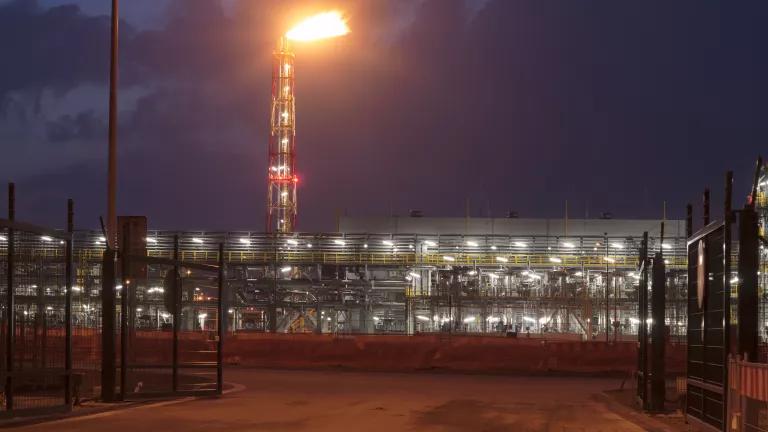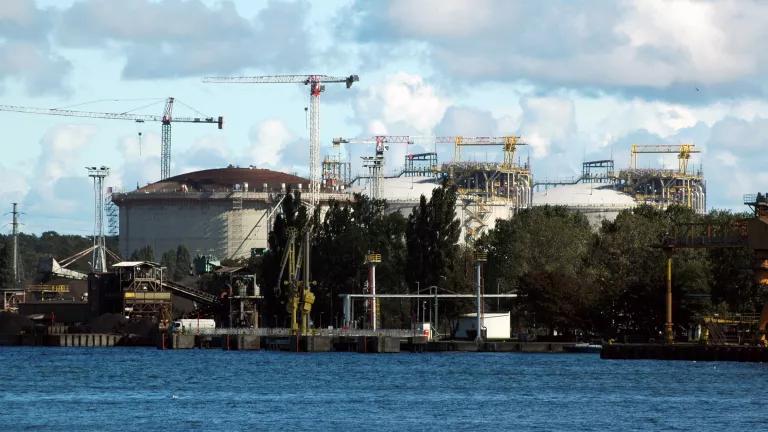Time for the Oil and Gas Industry to Pivot to Clean Energy Future
The world has spoken. The sun is setting on fossil fuels and the industry must change its business model.

Neville Hopwood/COP28, CC BY-NC-SA 4.0
Hosted by the world’s seventh-largest oil producer, the global climate talks that wrapped up this month in Dubai held the promise of a Nixon-to-China moment, a pivot point where the oil and gas industry might begin to shift from being the biggest part of the climate problem to finally being part of the fix.
It’s not a crazy idea.
The industry has unique expertise and resources. It can finance, engineer, and manage complicated projects under difficult conditions anywhere on the planet. Who better to help drive the global shift away from the fossil fuels that are cooking the planet and toward the clean energy solutions that drew $1.7 trillion in global investment this year?
Industry leaders could decide that their primary business isn’t to dig up oil and gas but, rather, to power the future in the best possible way, as some private analysts advise. And yet, given the chance to lead in the epic transition to clean energy, the global oil and gas industry did all it could to thwart that needed shift. The industry responded in Dubai with the hubris of a rapacious collective that has profited too well and too long from a business model that relies on destroying the planet.
It’s that business model, not the planet, that needs to change—and fast. As these climate talks made clear, it won’t happen if it’s left up to the oil and gas executives.
Political will—in the United States, as elsewhere—is needed to overcome industry efforts to block the action needed to ensure a livable future. Wih the world listing toward climate disaster, delegates from nearly 200 countries agreed in Dubai to transition away from coal, gas, and oil, the main drivers of climate change. That sends a clear message to investors, policymakers, and CEOs. More importantly, it lets our children know we won’t condemn them to a world of cascading climate disasters.
Nations agreed to triple renewable power by 2030, double the pace of energy efficiency gains, and phase out the absurd taxpayer subsidies—some $1.3 trillion each year—that prop up a fossil fuel industry that averages $3.5 trillion in annual profits worldwide.
That industry turned out in force in Dubai. More than 2,400 oil and gas lobbyists packed the climate talks, pressuring delegates to water down language and muddle the true intent behind the Dubai agreement. A handful of oil-producing nations—led by Saudi Arabia, Iran, and other members of the OPEC oil cartel—blocked some 185 countries from making an explicit call to phase out fossil fuels over the next three decades to avert worldwide climate catastrophe.
In effect, the Dubai agreement commits nations to doing just that. To succeed, they’ll have to overcome opposition from fossil fuel producers.
The United States, China, Russia, and the 17 other top energy-producing nations plan to extract twice as much coal, oil and gas by 2030 as a climate-safe world can tolerate. We’ve got to close that gap, not widen it—and fast.
The pace of planned industry expansion would set the world on course to blow past the global climate goal set in Paris in 2015: to limit global warming to well below 2 degrees Celsius (3.6 degrees Fahrenheit) and as close as possible to 1.5 degrees Celsius (2.7 degrees Fahrenheit). It’s also at odds with the International Energy Agency’s analysis that coal, gas, and oil will peak as a share of global energy supply later this decade, then steadily decline from there.
Under current policies and pledges, global oil and gas consumption will peak before 2030 and decline by about 2 percent, on average, each year until 2050, falling to about half of today’s consumption levels by then. If countries take the action needed to hold warming to 1.5 degrees, oil and gas consumption will fall by more than 5 percent a year, on average, to about a quarter of today’s demand by midcentury.
That means no new oil and gas development is needed, and even some existing projects will be retired before the end of their planned life cycle. Why, then, is the industry locked in a global competition to produce more and more of these destructive fuels before the clock runs out on a livable future?
Fossil fuel companies should recognize that the sun is setting on fossil fuels and make a deliberate strategic decision to thrive by helping to shape the clean energy future—and play a lead role in the economic play of our lifetime.
We need climate action to be a top priority in Washington!
Tell President Biden and Congress to slash climate pollution and reduce our dependence on fossil fuels.





